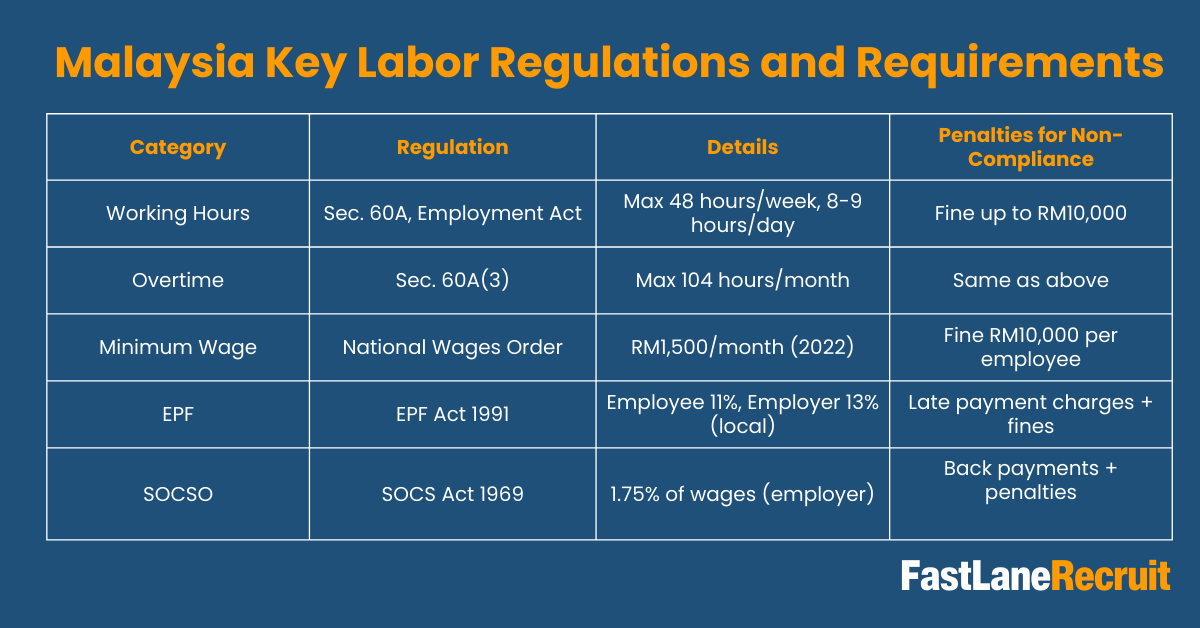Navigating employment law in Malaysia is essential for both employers and employees to ensure compliance, fair treatment, and workplace efficiency. With a dynamic regulatory framework covering wages, working hours, statutory benefits, termination procedures, and dispute resolution, understanding key labor laws is crucial for business success.
Whether you’re an employer seeking to hire and manage talent or an employee wanting to understand your rights, this guide provides a detailed overview of Malaysia’s employment regulations, offering clarity on everything from leave entitlements to workplace dispute resolution. Read on to explore how these laws shape the Malaysian labor market and how businesses can stay fully compliant with legal requirements.
Content Outline
Key Summary
Malaysia’s employment framework is governed by the Employment Act 1955, with additional regulations for specific industries
Standard workweek is 48 hours with overtime pay at 1.5-2x normal rates
Comprehensive leave entitlements including 98 days of maternity leave and 7 days of paternity leave
Mandatory benefits include EPF (11-13%), SOCSO, and EIS coverage
Strict termination procedures require proper notice or compensation
FastLaneRecruit provides end-to-end compliance hiring solutions for Malaysian labor laws
What is Employment Law in Malaysia?
Employment law in Malaysia governs the relationship between employers and employees, ensuring fair treatment, workplace rights, and compliance with labor regulations. The primary legislation is the Employment Act 1955, which outlines minimum employment standards, including wages, working hours, leave entitlements, and termination procedures. Other relevant laws include:
- Industrial Relations Act 1967 – Governs labor disputes and collective bargaining.
- Trade Unions Act 1959 – Regulates trade unions and their activities.
- Employees Provident Fund Act 1991 – Covers retirement savings contributions.
- Social Security Act 1969 – Provides social security benefits for employees.
These laws ensure that employees receive fair treatment while helping businesses maintain compliance with labor regulations.
Also Read: How to Effectively Hire and Manage Remote Employees: A Comprehensive Guide
Key Labor Regulations and Requirements
Malaysia’s employment laws establish fundamental rights and responsibilities for both employers and employees. Some key regulations include:
- Employment Contracts: Must be in writing and clearly define terms of employment, including job scope, salary, benefits, and termination clauses.
- Working Hours: Standard working hours are 48 hours per week, with overtime compensation for additional hours.
- Minimum Wage: As of 2023, the minimum wage is RM1,500 per month, applicable nationwide.
- Statutory Benefits: Employees are entitled to EPF (Employees Provident Fund) contributions, SOCSO (Social Security Organization) coverage, and EIS (Employment Insurance System) benefits.

Employers must ensure compliance with these regulations to avoid penalties and maintain a fair workplace.
Also Read: Hong Kong Seeks Malaysian Talent to Strengthen Workforce
Working Hours and Overtime
Employees in Malaysia typically work 8 hours per day or 48 hours per week. Overtime is compensated at 1.5 times the hourly wage on regular workdays and 2 times the hourly wage on rest days or public holidays.
| Work Type | Maximum Hours | Overtime Rate |
| Regular Workday | 8 hours/day | 1.5x hourly wage |
| Rest Day | As required | 2x hourly wage |
| Public Holiday | As required | 2x hourly wage |
Employers must ensure that overtime payments are made promptly and in accordance with labour laws.
Also Read: Benefits Of Offshoring Accounting In Malaysia
Leave Entitlements and Benefits
Employees are entitled to various types of leave, ensuring work-life balance and well-being.
Annual Leave
Annual leave entitlement depends on the length of service:
- Less than 2 years: 8 days
- 2 to 5 years: 12 days
- More than 5 years: 16 days
| Service Duration | Entitlement | Carry Forward |
| <2 years | 8 days | Max 6 days |
| 2-5 years | 12 days | Max 8 days |
| >5 years | 16 days | Max 10 days |
Employers must ensure that employees receive their entitled leave days without restrictions.
Also Read: Hiring Malaysian Talent: Employer of Record Malaysia Guide
Medical Leave (Sick and Hospitalization Leave)
Employees are entitled to 14 days of sick leave for service under 2 years, 18 days for 2-5 years, and 22 days for more than 5 years. Hospitalization leave extends up to 60 days per year.
Holiday
Employees are entitled to 11 paid public holidays annually, including national and state holidays.
Also Read: Malaysia Public Holiday 2025
Maternity Leave for Female Employees
Female employees are entitled to 98 days of paid maternity leave, with protection against dismissal during pregnancy.
Paternity Leave
As of 2023, fathers are entitled to 7 days of paid paternity leave, applicable to private sector employees.
Employers must ensure compliance with these leave entitlements to support employee well-being.
Wages
The minimum wage in Malaysia is RM1,500 per month, ensuring fair compensation for workers. Employers must pay wages within 7 days of the wage period’s end.
Employers must also ensure that deductions are lawful and comply with statutory requirements.
Also Read: Malaysia Salary Guide 2025
Termination
Termination procedures must comply with Malaysian labor laws. Employers must provide written notice, with notice periods varying based on the employment contract:
- Less than 2 years: 1 month
- 2 to 5 years: 2 months
- More than 5 years: 3 months.
Unfair dismissal cases can be brought to the Industrial Court, where employees may seek reinstatement or compensation.
Employers must ensure that termination procedures are fair and legally compliant.
Statutory Benefits
Employees in Malaysia receive EPF, SOCSO, and EIS contributions, ensuring financial security and social protection.
| Scheme | Employee Contribution | Employer Contribution |
| EPF | 11% | 13% (local), 12% (foreign) |
| SOCSO | 0.5% | 1.75% |
| EIS | 0.2% | 0.2% |
Employers must ensure timely contributions to these statutory benefits.
Permits and Licenses
Foreign employees require valid work permits, issued by the Immigration Department of Malaysia.
Employers must ensure foreign employees have the necessary permits to work legally in Malaysia.
Terms of Employment Contracts
Employment contracts must clearly define:
- Job scope and responsibilities
- Salary and benefits
- Leave entitlements
- Termination clauses
- Dispute resolution mechanisms.
Employers must ensure that contracts comply with Malaysian labor laws.
Also Read: Benefit of Outsourcing Accounting to Malaysia
Resolving Disputes
Employment disputes in Malaysia can arise due to various reasons, including unfair dismissal, wage disputes, contract disagreements, and workplace misconduct. The resolution process typically follows a structured approach to ensure fairness and compliance with labor laws. The three primary mechanisms for resolving employment disputes are:
1. Internal Grievance Procedures
Before escalating a dispute to external authorities, employees and employers are encouraged to resolve conflicts internally through structured grievance procedures. These procedures typically involve:
- Formal Complaint Submission: Employees submit a written complaint detailing the issue to their HR department or management.
- Investigation Process: The employer reviews the complaint, gathers evidence, and interviews relevant parties.
- Mediation and Discussion: Employers may arrange meetings between the concerned parties to reach a mutual resolution.
- Decision and Action: If the dispute is resolved, corrective actions such as policy changes, compensation adjustments, or disciplinary measures may be implemented.
- Appeal Process: If the employee is unsatisfied with the resolution, they may escalate the matter to external authorities.
Employers are encouraged to maintain transparent grievance policies to foster a fair and harmonious workplace.
2. Labor Department Mediation
If internal grievance procedures fail, employees can seek assistance from the Department of Labour Peninsular Malaysia (JTKSM), which provides mediation services to resolve disputes amicably. The mediation process includes:
- Filing a Complaint: Employees submit a formal complaint to the nearest labor office, detailing the nature of the dispute.
- Preliminary Review: A labor officer assesses the complaint and determines whether mediation is appropriate.
- Mediation Session: Both parties meet with a labor officer, who facilitates discussions to reach a voluntary settlement.
- Agreement or Escalation: If an agreement is reached, it is documented and enforced. If mediation fails, the dispute may proceed to the Labour Court or Industrial Court.
Labor Department mediation is a cost-effective and efficient way to resolve disputes without lengthy legal proceedings.
3. Industrial Court Hearings
For disputes that cannot be resolved through mediation, employees may escalate their case to the Industrial Court, which handles serious employment disputes, including unfair dismissal claims and trade union conflicts. The process involves:
- Filing a Case: Employees submit a representation to the Department of Industrial Relations, which reviews the claim.
- Conciliation Efforts: Before proceeding to court, the department attempts conciliation between the employer and employee.
- Formal Hearing: If conciliation fails, the case is referred to the Industrial Court, where both parties present evidence and arguments.
- Binding Decision: The court issues a legally binding decision, which may include reinstatement, compensation, or other remedies.
- Judicial Review: If either party disagrees with the ruling, they may seek judicial review in the High Court.
The Industrial Court plays a crucial role in ensuring fair employment practices and protecting workers’ rights.
Conclusion
Malaysia’s employment laws ensure fair treatment and workplace rights for employees while guiding employers on compliance. Understanding these regulations helps businesses operate smoothly while fostering a positive work environment.
Frequently Asked Questions
1. What is the basic employment law in Malaysia?
The Employment Act 1955 governs employment relationships, covering wages, working hours, leave entitlements, and termination.
2. What is the notice period for resignation in Malaysia?
Notice periods vary based on tenure:
- Less than 2 years: 1 month
- 2 to 5 years: 2 months
- More than 5 years: 3 months.
3. Can an employer hold salary in Malaysia?
No, employers must pay wages within 7 days of the end of the wage period. Delayed payments may result in penalties.
How FastLaneRecruit Can Help
FastLaneRecruit ensures full compliance with Malaysia’s employment laws, offering:
- Outsourcing solutions to Malaysia
- Employer of Record (EOR) services
- Talent acquisition and payroll management
- Workplace setup and IT support for offshore teams
With expertise in Malaysian labour regulations, FastLaneRecruit helps businesses navigate employment laws seamlessly. Contact us now to discuss your needs!


